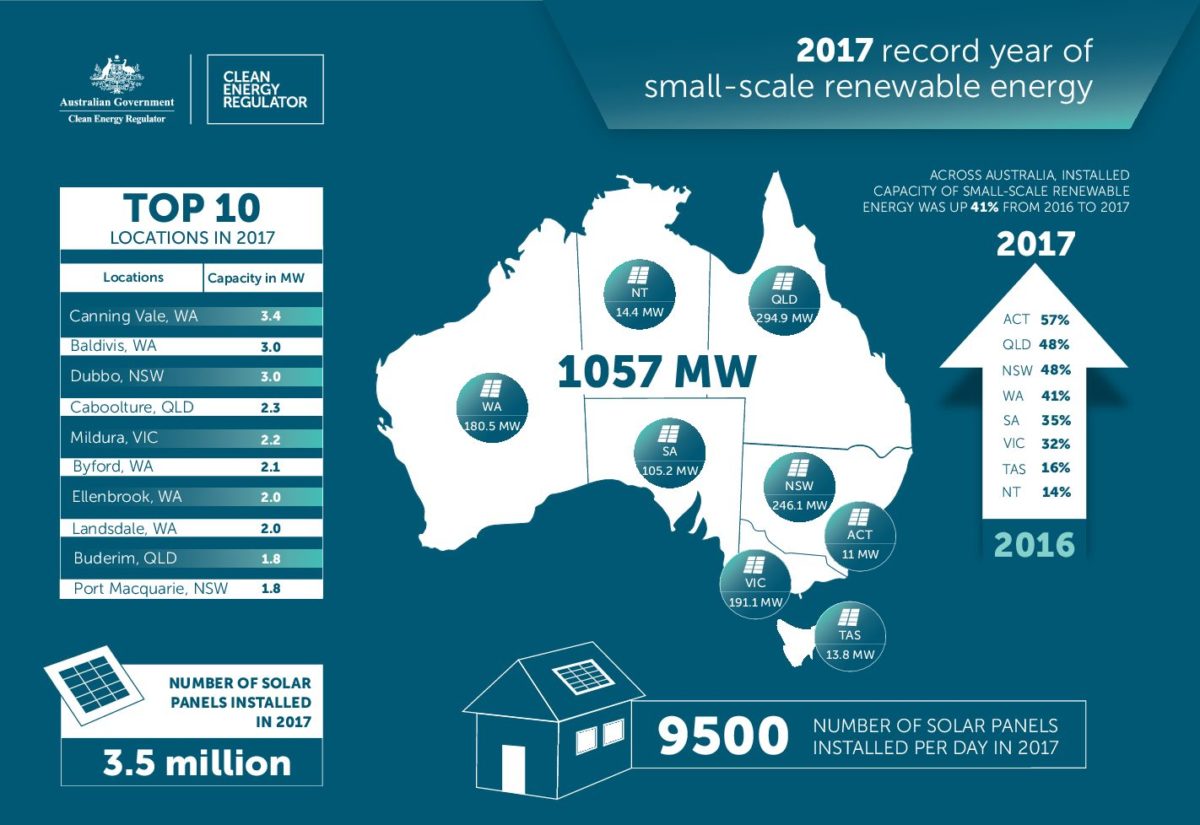The announcement confirms what has been reported by installers and suppliers, demand for rooftop PV in Australia has never been stronger. The Clean Energy Regulator has released figures today showing that 1057 MW of small-scale rooftop PV has been registered under the Small-scale Renewable Energy Scheme to date. That number is expected to increase to over 1070 MW as installers catch up on their paperwork.
The installation numbers should come as no surprise, as Green Energy Markets’ analysis of the regulator’s data in January tipped installations to reach close to 1.08 GW for the year.
The Clean Energy Regulator noted that the rooftop installation figures represent around 3.5 million solar modules were installed in 2017, or 9,500 a day.
“We are seeing a wide cross-section of Australians – households, community centres, schools, and small businesses – receiving incentives under the Small-scale Renewable Energy Scheme,” said Clean Energy Regulator Executive General Manager Mark Williamson in a statement. “Our data shows consumers are embracing renewable energy to take control of their electricity bills.”
While the number of solar installations is notable, it is the rapid increase in average solar system size that is truly impressive. The Clean Energy Regulator reports that average rooftop system size has increased from 3 kW to 6 kWp over the last five years.
Putting paid to assertions that rooftop PV is a luxury good affordable only by the rich, the regulator’s data points to rooftop solar being most enthusiastically adopted in the outer suburbs, fringing major state capitals, and in regional centres.
Of the top-10 locations for rooftop PV in 2017 reported, each one is either in regional Australia, or an outer suburb.
Five of the top-10 solar locations are outer suburbs of Perth. Canning Vale was the leading location for rooftop PV in WA, installing 3.4 MW of small-scale solar in 2017; followed by Baldivis at number two nationally with 3 MW; Byford (#4 with 2.1 MW); Ellenbrook (#7 with 2 MW); and Landsale (#8 with 2 MW).
None of the suburbs are within 20 km of Perth’s city centre.
Beyond Perth, regional centres lead the way for PV in 2017. Dubbo came in at number three with 3 MW, followed by Caboolture in QLD at four with 2.3 MW, Mildura at five with 2.2 MW, and Buderim on the QLD Sunshine Coast and Port Macquarie sharing nine and ten with 1.8 MW.
Looking forward, the Clean Energy Regulator noted that the industry “is going from strength to strength.”
“It looks like 2018 will be another big year for the solar industry,” said Williamson.
The Small-scale Renewable Energy Scheme, from which the data emanates, relates to solar systems below 100 kW in capacity.
This content is protected by copyright and may not be reused. If you want to cooperate with us and would like to reuse some of our content, please contact: editors@pv-magazine.com.









By submitting this form you agree to pv magazine using your data for the purposes of publishing your comment.
Your personal data will only be disclosed or otherwise transmitted to third parties for the purposes of spam filtering or if this is necessary for technical maintenance of the website. Any other transfer to third parties will not take place unless this is justified on the basis of applicable data protection regulations or if pv magazine is legally obliged to do so.
You may revoke this consent at any time with effect for the future, in which case your personal data will be deleted immediately. Otherwise, your data will be deleted if pv magazine has processed your request or the purpose of data storage is fulfilled.
Further information on data privacy can be found in our Data Protection Policy.